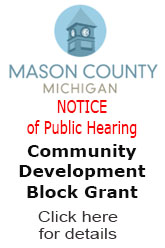Scottville senior center holding kinship caregivers dinner.
SCOTTVILLE — The Scottville Area Senior Center, 140 S. Main St., will host a dinner honoring grandparents raising grandchildren and other kinship caregivers on Thursday, Sept. 26, 2019 at 6 p.m. The event is in observation of Kinship Care Month.
Guest speakers will include Mason County Probate/Family Court Judge Jeff Nellis, State Sen. Curt VanderWall, State Rep. Jack O’Malley, Mason County commissioners Janet Anderson and Steven Hull.
Related article:
LANSING, MI – Relative caregivers – including grandparents, aunts and uncles, older siblings, along with the young people they are caring for – will travel from across Michigan to meet with lawmakers and advocate for state policy changes during the first Annual Relative Care Day at the Capitol on Wednesday, Sept. 18, 2019.
The Capitol Day is sponsored by the nonprofit advocacy group, Michigan’s Children, and the Kinship Care Resource Center, a community program within the School of Social Work at Michigan State University. Legislator co-sponsors for the event are State Reps. Kathy Crawford, R-Novi, and Frank Liberati, D-Allen Park.
Crawford and Liberati are taking the lead in a three-bill package aimed to improve support for relative caregivers including the state’s child welfare system for kids in foster care. The bills would build on the Assurance of Quality Foster Care Act passed last year.
The day’s events will run from 8:30 a.m. to 3 p.m. and highlight the experience and expertise of caregivers who are formally in the child welfare, foster care and adoption systems as well as those who are more informally providing care for their families. There are over 13,000 children and youth in Michigan’s foster care system which is struggling to increase the number of supportive homes for placements. Over 4,000 children and youth under the state’s care live with relatives – 1,500 who are licensed foster parents, and another 3,200 who are not.
“Discussions will focus on programs and initiatives that have benefited children and families, as well as programs that have inadequately served children and families in areas including financial support, navigator spaces, court system/legal options, mental health and other services, where policy changes could make a difference,” said Michigan’s Children Vice President of Programs Michele Corey. Caregivers and constituents will meet with lawmakers privately and in committee sessions scheduled during the day.
“Today’s first annual Relative Care Day at the Capitol is a chance for lawmakers to learn more about the experiences, triumphs and challenges of kinship families,” said Alicia Guevara Warren, the Director of the Kinship Care Resource Center.
“Kinship caregivers have stepped up to care for their relative children, and they need the support of the state,” said Guevara Warren. “While we know how rewarding and beneficial it is for a relative to provide care for a child, there are also so many challenges—many that can be addressed through changes in public policy.”
Michigan’s Children is the only statewide, multi-issue advocacy organization focused solely on public policy in the best interest of children from cradle to career and their families. We are a non-profit 501(c)(3) organization, and present FamilySpeak as a signature program and as a non-partisan activity. Michigan’s Children is eager to work with you on public issues affecting children, youth, and families.
The Kinship Care Resource Center (KCRC) is a non-profit statewide organization through the School of Social Work at Michigan State University. The mission of the Kinship Care Resource Center is to support Michigan’s kinship families by utilizing research to provide education and outreach to communities and agencies supporting kinship families and offer information and referral services to relatives raising relative children. The KCRC strives to ensure that all current and prospective kinship caregivers are supported and connected with resources and services that they need, and that all children in kinship care families achieve or maintain safety, permanency and well-being.

















.jpg)






















 (1).gif)












.png)






